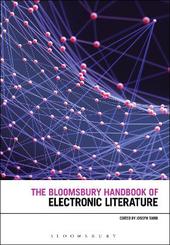
|
The Bloomsbury Handbook of Electronic Literature
Hardback
Main Details
| Title |
The Bloomsbury Handbook of Electronic Literature
|
| Authors and Contributors |
Edited by Professor Joseph Tabbi
|
| Series | Bloomsbury Handbooks |
|---|
| Physical Properties |
| Format:Hardback | | Pages:464 | | Dimensions(mm): Height 244,Width 169 |
|
| Category/Genre | Literary studies - from c 1900 -
Digital lifestyle |
|---|
| ISBN/Barcode |
9781474230254
|
| Classifications | Dewey:809.05 |
|---|
| Audience | | Postgraduate, Research & Scholarly | |
|---|
|
Publishing Details |
| Publisher |
Bloomsbury Publishing PLC
|
| Imprint |
Bloomsbury Academic
|
| Publication Date |
30 November 2017 |
| Publication Country |
United Kingdom
|
Description
Winner of the 2017 N. Katherine Hayles Award for Criticism of Electronic Literature A CHOICE Outstanding Academic Title 2018 The digital age has had a profound impact on literary culture, with new technologies opening up opportunities for new forms of literary art from hyperfiction to multi-media poetry and narrative-driven games. Bringing together leading scholars and artists from across the world, The Bloomsbury Handbook of Electronic Literature is the first authoritative reference handbook to the field. Crossing disciplinary boundaries, this book explores the foundational theories of the field, contemporary artistic practices, debates and controversies surrounding such key concepts as canonicity, world systems, narrative and the digital humanities, and historical developments and new media contexts of contemporary electronic literature. Including guides to major publications in the field, The Bloomsbury Handbook of Electronic Literature is an essential resource for scholars of contemporary culture in the digital era.
Author Biography
Joseph Tabbi is Professor in the Department of English at the University of Illinois at Chicago. He is Editor of the Electronic Book Review, a former President of the Electronic Literature Organization and his previous publications include Postmodern Sublime (1995), Cognitive Fictions (2002) and Nobody Grew But the Business: On the Life and Work of William Gaddis (2015).
ReviewsTabbi (English, Univ. of Illinois, Chicago) has organized his foundational handbook in four parts that provide a needed framework for the work in this field. The first two sections-"Ends, Beginnings," "Poetics, Polemics"-work their way through the key insights and concepts developed since the inception of the field. The other two sections-"Materialities, Ontologies," "Economies, Precarities"-provide key essays on how electronic literature's formats have helped to define contemporary digital life. Including an annotated bibliography of major texts in this field, this is an invaluable resource for those interested in where literature is going. Summing Up: Essential. * CHOICE *
|